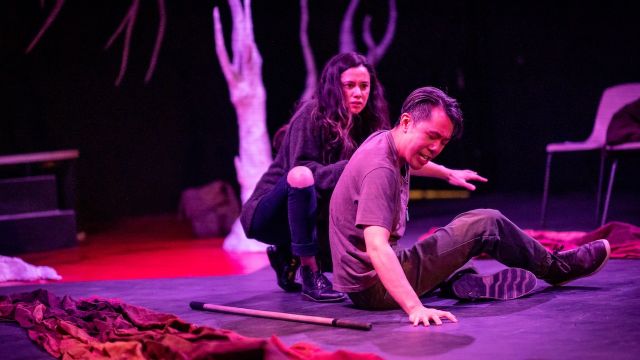Coldhands
‘Something is coming for us, something from below’ reads a slip of paper handed to me in the darkness by the Girl. The genuine tension of what might happen next is built brilliantly in this intimate experience of life in a world where for most, survival is their only goal.
It’s a familiar dystopia: the world has been rid of gold – a metaphor fors climate change, but the theme is kept simple enough for it to be capitalist greed, oppression of the masses, or any other planet-wide catastrophe us humans are capable of creating. What’s unfamiliar is the mystery of exactly where we are and what is happening – this is a slow-burn reveal, with the audience immersed in a mythical world, just a few steps away from now.

There’s a ‘aurum daemon’ that steals any gold that remains, and the remnants of society seem to be built around hunting one another for sacrifice. There is a constant ominous but unseen presence throughout, helped by the soundscape designed by Antonine Jelk and composed by Alex Mader. The Eno and Gabriel influences lift the droning synths into melody, and whilst this can sometimes overpower the actors, mostly it helps to shape the scene, able to turn it from calm to anxious through a change in pitch and tempo.
The writer, Dora Abraham, won the 2020 Flinders University Young Playwrights’ Award for this script and whilst on the surface, its genre is fantasy, it smashes it into reality with lines like ‘All stories are real’, pulling in the audience with a focus on the importance of traditional storytelling.

Ellanna Murphy’s set design is a wonderful, post-apocalyptic harshness of organic growth stilted and halted by human greed. Sculptures of dead trees frame a sacrificial altar, and either side of the traverse stage, earthy reds stain cloth that snake as if they were dried up rivers. Lit with intelligence and restraint by Kobe Donaldson, different spaces are defined without the need for traditional scene changes.
Director Zola Allen shapes her cast well in this space, using the space between the two rows of seats as entrances and exits to the stage, maintaining the audience’s close connection to the story. There are strong cinematic influences here, with Allen keeping her characters close to each other when conversing, which in this staging often means we’re looking at the back of one of them. It can be a little frustrating with quiet dialogue – though it does help to keep the tension high with gaps in the conversation not so easily explained.

Bonet Leate is Mother, her introductory monologue plunging us into disaster at odds with her engaging smile throughout. Holding the eyes of every individual in the audience as she speaks, she creates intimacy, not intimidation. Yet when called on to protect the Girl, her ferocity is convincing and brilliantly conveyed.
As the Girl, Danielle Lim warms up slowly, naïve with her hidden power, but grows in strength and confidence, particularly when bouncing off Sam Lau’s Hunter. As the story untwists, Lim is authentic in her daring and liberation, revealing her increasing realisation of her place in this dysfunctional culture.
Lau’s character is someone who knows and understands the land and its languages – his portrayal as a twitchy survivor is superbly nuanced, his dual delivery of English and Cantonese dialogue is a beautiful, lyrical balance; you don’t need to understand every word to know what he’s saying.

This play is almost complete: at its centre is a powerful story of how our connection with the land and good storytelling is slipping through our fingers, but the mystery and allegory doesn’t quite translate to a call to action. The old saying ‘cold hands, warm heart’ is particularly appropriate for this award-winning contribution to Australian theatre from Adelaide’s Rumpus.
Mark Wickett
Images: @photosbyjamois
Subscribe to our E-Newsletter, buy our latest print edition or find a Performing Arts book at Book Nook.

